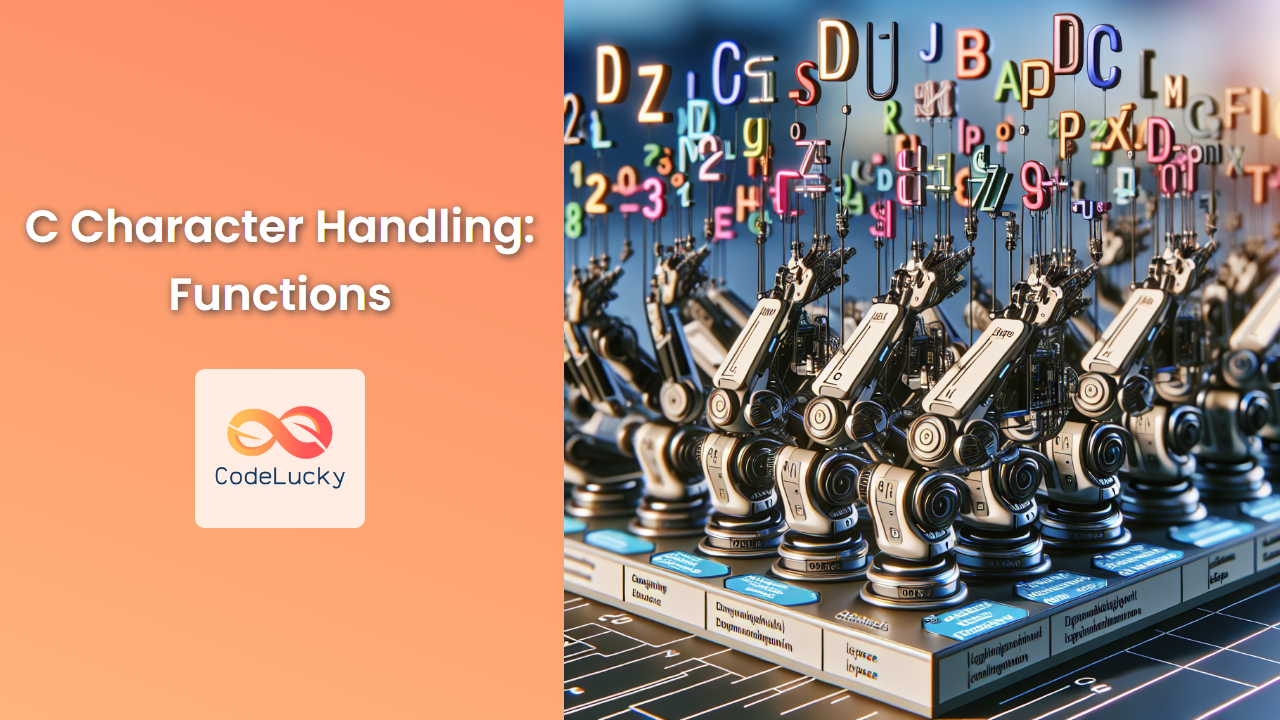In the world of C programming, character handling is a fundamental skill that every developer should master. The <ctype.h> header file in C provides a set of powerful functions that make working with characters a breeze. These functions are not only efficient but also enhance the readability and maintainability of your code. In this comprehensive guide, we'll dive deep into the <ctype.h> library, exploring its functions with practical examples and real-world applications.
Introduction to
The <ctype.h> header file is a part of the C standard library that offers a collection of functions designed for character classification and transformation. These functions are particularly useful when you need to:
- Determine the type of a character (e.g., alphabetic, numeric, punctuation)
- Convert characters between uppercase and lowercase
- Check for specific character properties
Let's begin our journey by exploring the character classification functions provided by <ctype.h>.
Character Classification Functions
1. isalpha()
The isalpha() function checks whether a given character is an alphabetic character (A-Z or a-z).
#include <stdio.h>
#include <ctype.h>
int main() {
char ch = 'A';
if (isalpha(ch)) {
printf("'%c' is an alphabetic character.\n", ch);
} else {
printf("'%c' is not an alphabetic character.\n", ch);
}
return 0;
}
Output:
'A' is an alphabetic character.
2. isdigit()
The isdigit() function checks if a character is a decimal digit (0-9).
#include <stdio.h>
#include <ctype.h>
int main() {
char ch = '7';
if (isdigit(ch)) {
printf("'%c' is a digit.\n", ch);
} else {
printf("'%c' is not a digit.\n", ch);
}
return 0;
}
Output:
'7' is a digit.
3. isalnum()
The isalnum() function checks if a character is alphanumeric (A-Z, a-z, or 0-9).
#include <stdio.h>
#include <ctype.h>
int main() {
char ch = 'X';
if (isalnum(ch)) {
printf("'%c' is alphanumeric.\n", ch);
} else {
printf("'%c' is not alphanumeric.\n", ch);
}
return 0;
}
Output:
'X' is alphanumeric.
4. isspace()
The isspace() function checks if a character is a whitespace character (space, tab, newline, etc.).
#include <stdio.h>
#include <ctype.h>
int main() {
char ch = '\t';
if (isspace(ch)) {
printf("The character is a whitespace.\n");
} else {
printf("The character is not a whitespace.\n");
}
return 0;
}
Output:
The character is a whitespace.
5. ispunct()
The ispunct() function checks if a character is a punctuation character.
#include <stdio.h>
#include <ctype.h>
int main() {
char ch = '!';
if (ispunct(ch)) {
printf("'%c' is a punctuation character.\n", ch);
} else {
printf("'%c' is not a punctuation character.\n", ch);
}
return 0;
}
Output:
'!' is a punctuation character.
Character Conversion Functions
The <ctype.h> library also provides functions for converting characters between uppercase and lowercase.
1. toupper()
The toupper() function converts a lowercase letter to uppercase.
#include <stdio.h>
#include <ctype.h>
int main() {
char ch = 'a';
char upper_ch = toupper(ch);
printf("Original: %c, Uppercase: %c\n", ch, upper_ch);
return 0;
}
Output:
Original: a, Uppercase: A
2. tolower()
The tolower() function converts an uppercase letter to lowercase.
#include <stdio.h>
#include <ctype.h>
int main() {
char ch = 'Z';
char lower_ch = tolower(ch);
printf("Original: %c, Lowercase: %c\n", ch, lower_ch);
return 0;
}
Output:
Original: Z, Lowercase: z
Practical Applications
Now that we've covered the basics, let's explore some practical applications of these functions in real-world scenarios.
1. Password Strength Checker
Let's create a simple password strength checker using <ctype.h> functions.
#include <stdio.h>
#include <ctype.h>
#include <string.h>
int check_password_strength(const char *password) {
int strength = 0;
int has_upper = 0, has_lower = 0, has_digit = 0, has_punct = 0;
for (int i = 0; password[i] != '\0'; i++) {
if (isupper(password[i])) has_upper = 1;
if (islower(password[i])) has_lower = 1;
if (isdigit(password[i])) has_digit = 1;
if (ispunct(password[i])) has_punct = 1;
}
strength = has_upper + has_lower + has_digit + has_punct;
if (strlen(password) < 8) strength--;
return strength;
}
int main() {
char password[50];
printf("Enter a password: ");
scanf("%49s", password);
int strength = check_password_strength(password);
printf("Password strength: ");
switch(strength) {
case 0:
case 1:
printf("Weak\n");
break;
case 2:
case 3:
printf("Moderate\n");
break;
case 4:
printf("Strong\n");
break;
default:
printf("Very Strong\n");
}
return 0;
}
This program uses isupper(), islower(), isdigit(), and ispunct() to check for different character types in the password, determining its strength based on the variety of characters used.
2. Text Analyzer
Let's create a text analyzer that counts different types of characters in a given text.
#include <stdio.h>
#include <ctype.h>
#include <string.h>
void analyze_text(const char *text) {
int alphabets = 0, digits = 0, spaces = 0, punctuations = 0, others = 0;
for (int i = 0; text[i] != '\0'; i++) {
if (isalpha(text[i])) alphabets++;
else if (isdigit(text[i])) digits++;
else if (isspace(text[i])) spaces++;
else if (ispunct(text[i])) punctuations++;
else others++;
}
printf("Text Analysis:\n");
printf("Alphabets: %d\n", alphabets);
printf("Digits: %d\n", digits);
printf("Spaces: %d\n", spaces);
printf("Punctuations: %d\n", punctuations);
printf("Other characters: %d\n", others);
}
int main() {
char text[1000];
printf("Enter a text (up to 999 characters):\n");
fgets(text, sizeof(text), stdin);
// Remove newline character if present
if (text[strlen(text) - 1] == '\n') {
text[strlen(text) - 1] = '\0';
}
analyze_text(text);
return 0;
}
This program uses various <ctype.h> functions to categorize and count different types of characters in the input text.
3. Case Converter
Let's create a program that converts text to uppercase or lowercase based on user choice.
#include <stdio.h>
#include <ctype.h>
#include <string.h>
void convert_case(char *text, int to_upper) {
for (int i = 0; text[i] != '\0'; i++) {
if (to_upper) {
text[i] = toupper(text[i]);
} else {
text[i] = tolower(text[i]);
}
}
}
int main() {
char text[1000];
int choice;
printf("Enter a text (up to 999 characters):\n");
fgets(text, sizeof(text), stdin);
// Remove newline character if present
if (text[strlen(text) - 1] == '\n') {
text[strlen(text) - 1] = '\0';
}
printf("Choose conversion:\n");
printf("1. To Uppercase\n");
printf("2. To Lowercase\n");
scanf("%d", &choice);
switch(choice) {
case 1:
convert_case(text, 1);
printf("Uppercase: %s\n", text);
break;
case 2:
convert_case(text, 0);
printf("Lowercase: %s\n", text);
break;
default:
printf("Invalid choice\n");
}
return 0;
}
This program uses toupper() and tolower() functions to convert the entire text to uppercase or lowercase based on the user's choice.
Performance Considerations
While <ctype.h> functions are convenient and improve code readability, it's worth noting that they may introduce a slight performance overhead compared to direct character comparisons. However, for most applications, this difference is negligible, and the benefits of using these standard functions often outweigh the minimal performance cost.
For example, consider these two approaches to check if a character is a digit:
// Using isdigit()
if (isdigit(ch)) {
// ...
}
// Direct comparison
if (ch >= '0' && ch <= '9') {
// ...
}
While the direct comparison might be marginally faster, the isdigit() function is more readable and less prone to errors, especially when dealing with different character encodings.
Conclusion
The <ctype.h> library in C provides a powerful set of functions for character handling. These functions not only make your code more readable and maintainable but also help in writing more robust and portable programs. By mastering these functions, you can efficiently handle various character-related tasks in your C programs, from simple character checks to complex text processing applications.
Remember, while it's important to understand the underlying mechanics of character handling, using standard library functions like those in <ctype.h> often leads to cleaner, more maintainable, and potentially more portable code. As you continue your journey in C programming, make these functions a part of your toolkit, and you'll find yourself writing more efficient and elegant code.
Happy coding! 🚀💻

















